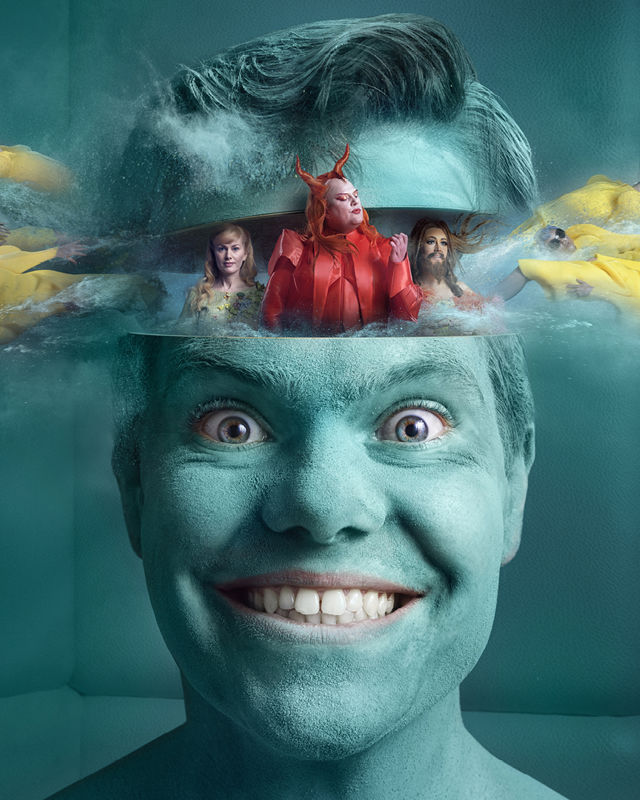The Rake’s
Progress
 Photo: Stig Håvard Dirdal
Photo: Stig Håvard Dirdal
From a life of luxury to madness
A machine that turns stones into bread, a bearded lady, a mental hospital – and love: Journey down a delightfully dark spiral into the mind of a madman in Vidar Magnussen’s production of Stravinsky’s fiendish opera.
Pact with the devil
The combination of being lackadaisical and greedy is dangerous. Tom Rakewell learns this the hard way. He is madly in love with the kind-hearted Anne Trulove, but there’s a hitch – her father wants Tom to have a job, but Tom feels he is not cut out for a life of drudgery!
Fortunately, the diabolical Nick Shadow shows up and announces an opportune money inheritance from an obscure uncle, so Tom goes to London in search of happiness.
Downward spiral
The temptations of the city are many and Anne’s love is not enough for Tom to resist an increasingly debauched lifestyle. Nick Shadow has all the answers – including marriage to a bearded lady! Or an ingenious machine that turns stones into bread! The path that Shadow leads Tom down ends at a mental hospital.
But Anne continues to have faith in Tom and fights against the delusions that have taken hold on Tom’s mind.
Absurd chamber of horrors
Director Vidar Magnussen has returned to the Oslo Opera House to toy with our perceptions of reality in this horror show of a performance. He takes us inside Tom Rakewell’s head on a wild journey from riches and a life of luxury to poverty and insanity.
Magnussen debuted as an opera director with Orpheus in the Underworld in 2021 and repeated the success in 2023. This time round, he has stepped up from operetta to opera and created a darker universe in the form of an absurd, burlesque fantasy world with an aesthetic taken from the 50s and 60s.
Mozart through a funhouse mirror
Igor Stravinsky wrote The Rake’s Progress in 1951, based on eight satirical paintings by William Hogarth. Stravinsky was one of the most prominent composers of the 20th century and can best be described as a sort of hipster composer who turned conventional music upside down and shamelessly borrowed from other operas and composers.
As an opera composer, Stravinsky wanted to follow in the footsteps of Mozart. The music in his only completed opera is a collision between tradition and anarchy, reminiscent of both Mozart and Beethoven – and distorted through a funhouse mirror.
Synopsis
Tom Rakewell is madly in love with Anne Trulove, but refuses to find a job to support her. The diabolical Nick Shadow appears with promises of a secret inheritance, and takes Tom on a fateful journey. Tom entangles himself further and further in the web of madness.
Tom Rakewell is courting Anne Trulove outside her father's house in the country. Father Trulove has doubts about his daughter's proposed marriage and tries to arrange a regular job for Tom; but Tom resists the idea and, left on his own, declares his intention to "live by my wits and trust to my luck." When Tom expresses his wish for money, Nick Shadow appears and tells him that an unknown uncle has left him a substantial fortune. He then invites Tom to employ him as a servant and accompany Tom to London to sort out the inheritance.
The second scene, set in Mother Goose's brothel, shows Shadow introducing his new master to the sleazy aspects of London life. But Tom is uneasy and laments his betrayal of love, yet accepts Mother Goose's invitation to spend the night with her. Meanwhile, back in the country, Anne wonders why she has not heard from Tom. She knows somehow that he is in danger, and sets out for London to aid him.
Tom is bored with his dissolute life. He utters his second crucial wish, for happiness, whereupon Nick makes the odd suggestion that he demonstrate his freedom by marrying Baba the Turk, the famous bearded lady. Soon afterwards Anne finds Tom's London house, only to see him emerge together with Baba, whom he has just married. Tom tells Anne to leave, yet genuinely regrets what has happened.
In the next scene Tom is clearly finding his eccentric marriage intolerable, as Baba is a chatterbox with a fiery temper. He silences her with medication, then falls asleep. Nick enters with a "fantastic Baroque Machine" and hints that if such machines were mass-produced Tom could become a saviour of mankind and Tom sets out to market the machine, not knowing it is a sham.
The plan has failed – the act starts with the auction of the ruined Tom's property by the maniac auctioneer Sellem. The objects for sale include Baba, who has remained immobile since being silenced. When unwrapped, she resumes her tantrum, now directed at the auction-goers, but calms down when Anne enters. Baba advises her to find Tom and "set him right", and warns her against Nick Shadow.
In a graveyard, Nick reveals his identity and demands payment from Tom, in the form of his soul; but as midnight strikes, Nick offers him an escape in the form of a game of cards; this section is accompanied only by harpsichord. Tom wins, thanks to the benign influence of Anne. Defeated, Nick sinks into the ground, condemning Tom to insanity as he goes. Consigned to Bedlam, Tom believes he is Adonis. Anne ("Venus") visits him, sings him to sleep, then quietly leaves him. When he realises she has gone, he dies.
In an epilogue, each of the principal characters gives a moral drawn from their scenes in the opera, and then come together to ascribe a final joint moral, "for idle hands, and hearts and minds, the Devil finds a work to do."